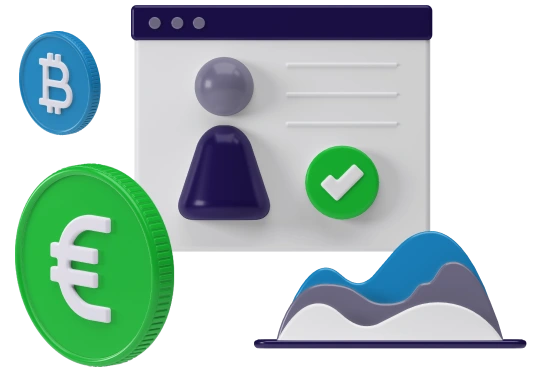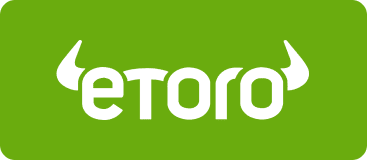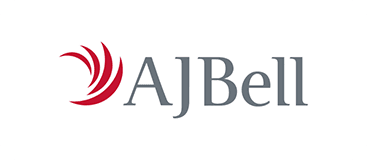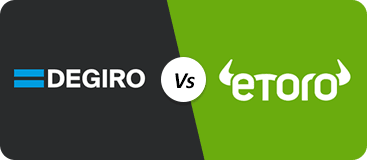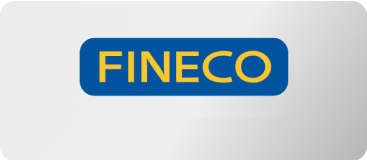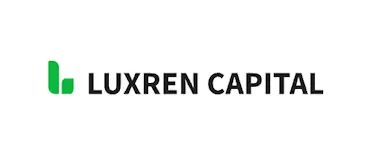
77% of retail investor accounts lose money when trading CFDs with this provider. You should consider whether you can afford to take the high risk of losing your money.
50% of retail investor accounts lose money when trading CFDs with this provider. You should consider whether you can afford to take the high risk of losing your money.
Which broker to choose: eToro or Plus500?
We tested eToro and Plus500 in ten different categories. According to our methodology, eToro received an aggregate score of 82/100; Plus500 achieved a score of 91/100.
In fact, in many areas, Plus500 it's better than eToro.
Plus500 is a modern online broker with a user-friendly platform and app, through which you can trade on 7 asset classes and thousands of products.
eToro is an online broker that allows trading not only on CFDs but also on real shares, ETFs and cryptocurrencies.
With eToro, an investor can trade independently on the trading platform or can make use of innovative copy trading services (in which one can copy the strategy of other experienced traders) or copy portfolio (in which one can replicate an investment portfolio with a passive strategy).
❓ For those starting to invest, is eToro or Plus500 better?
Both brokers offer platforms and tools that are easy to use for beginners. Even before investing with real money, you can practice with a virtual account with both Plus500 (click here to try the eToro virtual account) and eToro.
Plus500 only offers CFD trading, whereas eToro also allows you to trade stocks, cryptocurrencies and real ETFs without leverage.
With the demo account, you get virtual money to simulate trading and learn how to trade without risking real money.
Once you feel ready, you can switch to the real account, taking advantage of the minimum deposits that the two brokers require.
Plus500 1 - eToro 1
❓ Is eToro or Plus500 safer?
Both eToro and Plus500 are Israeli brokers. Both serve UK clients with an investment firm based in London and are authorised by the FCA. This means that European investment regulations (capital protection, asset segregation, etc.) apply to both.
Plus500 offers security services such as two-factor authentication (2FA) for the apps and an SSL certificate for the website and WebTrader platform.
This is why we can consider both brokers to be regulated and supervised: in other words, we won't run into any scams when trading with either eToro or Plus500.
Plus500 is also listed on the stock exchange. As a result, its balance sheets and financial statements are made public for all to see, increasing its transparency.
For this latter reason, we can describe Plus500 as slightly more transparent than eToro.
Plus500 2 - eToro 1
❓ Is eToro's platform better than Plus500's platform?
Let's start with the assumption that both offer a very user-friendly platform and app.
Although simple, the Plus500 platform is more comprehensive than that of eToro: more analytical tools, more intuitive product search and more sophisticated mobile trading.
Plus500's platform and app are better than those offered by eToro.
Plus500 3 - eToro 1
❓ Which of the two brokers offers the best costs and fees?
Both eToro and Plus500 offer an account that can be opened at no cost. There are some inactivity fees but to avoid these log in at least once every quarter.
eToro allows you to trade real shares, ETFs and cryptocurrencies. Trading these assets means avoiding overnight financing costs. Costs that are incurred with CFDs offered by both Plus500 and eToro. For medium to long-term investments, CFDs are not suitable.
If, on the other hand, we want to use CFDs for day-to-day trading, then Plus500 offers tighter spreads than eToro.
In summary, on the cost side, Plus500 beats eToro for daily trades (opened and closed within the same day). For trades longer than one day, eToro beats Plus500.
Plus500 4 - eToro 2
❓ What can you invest in with eToro and with Plus500?
As we have already mentioned, eToro allows you to trade both CFDs and real stocks, ETFs and cryptocurrencies.
Plus500 only offers CFD trading.
If we look at the assets that can be traded with the two brokers, we will see that the offerings are equal.
Both offer trading on stocks, indices, Forex, commodities, ETFs and cryptocurrencies.
In addition, Plus500 also offers CFD trading options.
In terms of the total number of tradable products, Plus500 slightly exceeds eToro.
The market and product offerings of eToro and Plus500 are broadly equal.
Plus500 5 - eToro 3
At the end of this comparison review, Plus500 proves to be a more complete broker than eToro.
From safety to platforms, mobile trading and the range of markets and instruments on offer, Plus500 offers a complete and professional trading environment.
If you would like to gather more information on the two brokers we have compared, you can visit the eToro review page or the Plus500 review page.
Or compare Plus500 vs eToro with the QualeBroker comparison tool.
eToro es una plataforma de inversión con varios activos. El valor de sus inversiones puede subir o bajar. Su capital está en riesgo.
Have you decided which of Plus500 and eToro best suits your investment needs? Well! If you would like to try out the Plus500 or eToro platform, use the button below to try out the demo account with virtual money.
77% of retail investor accounts lose money when trading CFDs with this provider. You should consider whether you can afford to take the high risk of losing your money.
46% of retail investor accounts lose money when trading CFDs with this provider. You should consider whether you can afford to take the high risk of losing your money.
Please note that CFDs are complex instruments and come with a high risk of losing money rapidly due to leverage. 50% of retail investor accounts lose money when trading CFDs with this provider. You should consider whether you understand how CFDs work, and whether you can afford to take the high risk of losing your money.
This communication is intended for information and educational purposes only and should not be considered investment advice or investment recommendation. Past performance is not an indication of future results.
Copy Trading does not amount to investment advice. The value of your investments may go up or down. Your capital is at risk.
Don’t invest unless you’re prepared to lose all the money you invest. This is a high-risk investment and you should not expect to be protected if something goes wrong. Take 2 mins to learn more.
eToro USA LLC does not offer CFDs and makes no representation and assumes no liability as to the accuracy or completeness of the content of this publication, which has been prepared by our partner utilizing publicly available non-entity specific information about eToro.





